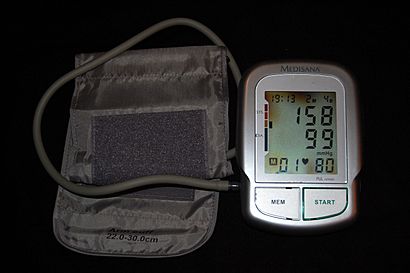Hypertension facts for kids
Quick facts for kids Hypertension |
|
|---|---|
| Synonyms | Arterial hypertension, high blood pressure |
 |
|
| Automated arm blood pressure meter showing arterial hypertension (shown a systolic blood pressure 158 mmHg, diastolic blood pressure 99 mmHg and heart rate of 80 beats per minute) | |
| Symptoms | None |
| Complications | Coronary artery disease, stroke, heart failure, peripheral arterial disease, vision loss, chronic kidney disease, dementia |
| Causes | Usually lifestyle and genetic factors |
| Risk factors | Excess salt, excess body weight, smoking, alcohol |
| Diagnostic method | Resting blood pressure 130/80 or 140/90 mmHg |
| Treatment | Lifestyle changes, medications |
| Frequency | 16–37% globally |
| Deaths | 9.4 million / 18% (2010) |
Hypertension is also known as high blood pressure. It's a health condition where the blood pressure in your arteries (the tubes that carry blood from your heart) is too high. This makes your heart work extra hard to pump blood around your body.
Contents
What is Blood Pressure?
Your blood moves through your arteries with a certain amount of pressure. This pressure changes as your heart works.
- When your heart squeezes to pump blood out, the pressure goes up. This is called the systolic blood pressure.
- When your heart relaxes between beats, the pressure goes down. This is called the diastolic blood pressure.
Blood pressure is usually written as two numbers, like 120/80. The first number is the systolic pressure, and the second is the diastolic pressure. For example, 120/80 is read as "120 over 80."
Types of High Blood Pressure
There are two main types of hypertension:
- Primary hypertension: This is the most common type, making up about 90-95% of cases. It means that the high blood pressure doesn't have a clear cause from another illness. It often develops slowly over many years.
- Secondary hypertension: This type is less common (about 5-10% of cases). It means the high blood pressure is caused by another health problem or medication. For example, kidney disease can sometimes lead to secondary hypertension.
Why is High Blood Pressure a Problem?
If blood pressure stays too high for a long time, it can damage your body. It can lead to serious health issues like:
- Heart attack
- Stroke
- Heart failure (when the heart can't pump blood well)
- Kidney failure
To stay healthy, doctors usually recommend keeping blood pressure below 140/90 mmHg for most people.
How to Treat High Blood Pressure
Lifestyle Changes
Often, people can lower their blood pressure by making healthy changes to their daily lives. Doctors might suggest:
- Losing weight if you are overweight or obese.
- Doing physical activity regularly.
- Eating less salt.
- Limiting how much alcohol you drink.
- Eating plenty of fruits and vegetables.
Medicine for High Blood Pressure
If lifestyle changes aren't enough, a doctor might prescribe medications. These medicines help lower blood pressure in different ways. Some common types include:
- Diuretics: These medicines help your body get rid of extra water and salt, which can lower blood pressure.
- Beta blockers: These slow down your heart rate, making your heart pump with less force.
- ACE inhibitors: These medicines help to relax your arteries, making it easier for blood to flow through.
How Effective is Treatment?
Even a small drop in blood pressure can make a big difference for your health. For example, if someone's blood pressure goes down by just 5 mmHg (like from 150/100 to 145/95), it can greatly lower their risk of a stroke or heart disease.
Related Pages
- Blood pressure
- Heart
- Arteries
- Circulatory system
- Hypotension (low blood pressure)
Images for kids
See also
 In Spanish: Hipertensión arterial para niños
In Spanish: Hipertensión arterial para niños
 | Bessie Coleman |
 | Spann Watson |
 | Jill E. Brown |
 | Sherman W. White |





